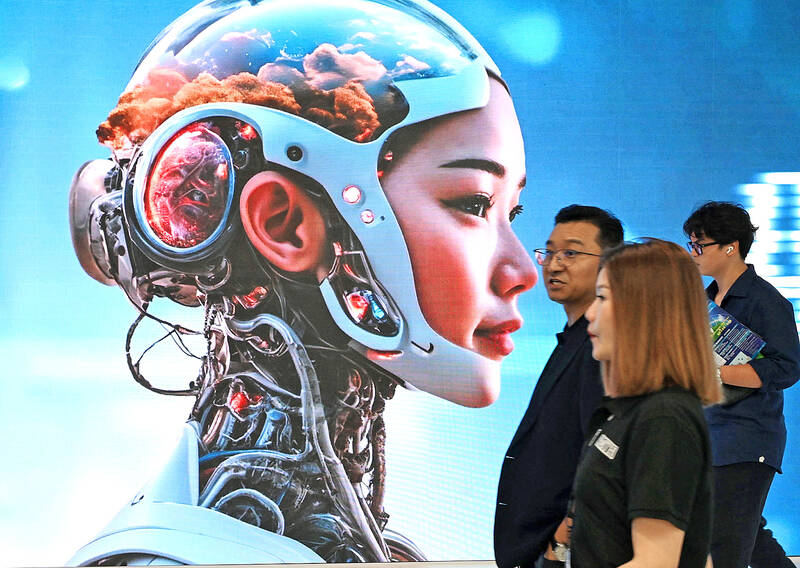Taiwan should fight for discursive dominance in artificial intelligence (AI)-related issues, rather than serving as merely an original equipment manufacturer (OEM) of AI systems, an Asia Group expert said yesterday.
The business consulting group on Wednesday published a report titled “Everything, everywhere, all at once: the emerging AI governance in Indo-Pacific and its implications for data-driven businesses.”
The report states that in AI governance, there are two main categories of countries in the Indo-Pacific region: pro-innovation and pro-security.

Photo: Chang Chia-ming, Taipei Times
“Our findings suggest that … Indo-Pacific economies’ national AI strategies are more likely to diverge than converge… Compounding this challenge is the US’ current aversion to taking the lead in setting regional standards,” the report said.
The report also said that China, with its security-focused political system, is keen to export its AI governance model abroad.
Taiwan adopts a “pro-innovation rule-taking” framework in AI governance, the report said
“As the world’s largest contributor to advanced semiconductor manufacturing and production, Taiwan is well-positioned to effectively develop and integrate AI at home,” the report said.
“However, the island’s contested sovereignty and ensuing exclusion from many international institutions will limit Taipei’s ability to set the global AI policy agenda,” it added.
George Chen (陳澍), managing director and head of the Hong Kong and Taiwan offices and cochair of digital practice for The Asia Group, said Taiwan paid early attention to AI governance compared with other nations in the region and has kept up with global trends.
Taiwan has an absolute advantage in AI hardware and is a little behind in AI software, Chen said, adding that the government should consider how to make sure the latter can catch up with the former through supporting policies.
Now is the time to set game rules of how AI should be developed, he said.
“After you have the AI draft act passed at the legislature, you should consider how to export Taiwan’s AI governance experiences to the world. You should fight for discursive dominance in AI in the international community through democratic allies, such as the US and Japan,” Chen said.
“It would be a pity if Taiwan serves only as an OEM in the AI era,” Chen added.
Countries around the world are currently seeking to establish AI governance principles, although progress has varied. The US has only used AI executive orders and state government bills, while the EU’s first AI law took effect last month.
The Ministry of Digital Affairs announced a draft AI basic act on July 15, which, if passed by the legislature would make Taiwan only the second country to have an AI law.

TRAFFIC SAFETY RULES: A positive result in a drug test would result in a two-year license suspension for the driver and vehicle, and a fine of up to NT$180,000 The Ministry of Transportation and Communications is to authorize police to conduct roadside saliva tests by the end of the year to deter people from driving while under the influence of narcotics, it said yesterday. The ministry last month unveiled a draft of amended regulations governing traffic safety rules and penalties, which included provisions empowering police to conduct mandatory saliva tests on drivers. While currently rules authorize police to use oral fluid testing kits for signs of drug use, they do not establish penalties for noncompliance or operating procedures for officers to follow, the ministry said. The proposed changes to the regulations require

The Executive Yuan yesterday announced that registration for a one-time universal NT$10,000 cash handout to help people in Taiwan survive US tariffs and inflation would start on Nov. 5, with payouts available as early as Nov. 12. Who is eligible for the handout? Registered Taiwanese nationals are eligible, including those born in Taiwan before April 30 next year with a birth certificate. Non-registered nationals with residence permits, foreign permanent residents and foreign spouses of Taiwanese citizens with residence permits also qualify for the handouts. For people who meet the eligibility requirements, but passed away between yesterday and April 30 next year, surviving family members

The German city of Hamburg on Oct. 14 named a bridge “Kaohsiung-Brucke” after the Taiwanese city of Kaohsiung. The footbridge, formerly known as F566, is to the east of the Speicherstadt, the world’s largest warehouse district, and connects the Dar-es-Salaam-Platz to the Brooktorpromenade near the Port of Hamburg on the Elbe River. Timo Fischer, a Free Democratic Party member of the Hamburg-Mitte District Assembly, in May last year proposed the name change with support from members of the Social Democratic Party and the Christian Democratic Union. Kaohsiung and Hamburg in 1999 inked a sister city agreement, but despite more than a quarter-century of

China Airlines Ltd (CAL) yesterday morning joined SkyTeam’s Aviation Challenge for the fourth time, operating a demonstration flight for “net zero carbon emissions” from Taiwan Taoyuan International Airport to Bangkok. The flight used sustainable aviation fuel (SAF) at a ratio of up to 40 percent, the highest proportion CAL has achieved to date, the nation’s largest carrier said. Since April, SAF has become available to Taiwanese international carriers at Taipei International Airport (Songshan airport), Kaohsiung International Airport and Taoyuan airport. In previous challenges, CAL operated “net zero carbon emission flights” to Singapore and Japan. At a ceremony at Taoyuan airport, China Airlines chief sustainability